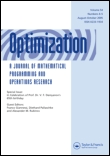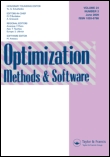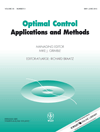
OPTIMIZATION
Scope & Guideline
Advancing the frontiers of optimization research.
Introduction
Aims and Scopes
- Diverse Optimization Techniques:
The journal covers a broad spectrum of optimization techniques, including linear, nonlinear, convex, nonconvex, and integer programming, as well as advanced methods such as bilevel and multi-objective optimization. - Algorithm Development:
A significant focus is placed on the development of new algorithms for solving optimization problems, including iterative methods, proximal algorithms, and hybrid techniques that combine various approaches for improved efficiency. - Applications Across Disciplines:
The journal features applications of optimization in fields such as finance, engineering, machine learning, and operations research, demonstrating the versatility of optimization methodologies in addressing real-world challenges. - Theoretical Contributions:
Theoretical advancements in optimization, such as optimality conditions, duality theory, and convergence analysis, are essential components of the journal, contributing to the foundational understanding of optimization problems. - Stochastic and Robust Optimization:
There is a growing emphasis on stochastic and robust optimization techniques, reflecting the need to address uncertainty and variability in optimization models, particularly in complex systems.
Trending and Emerging
- Machine Learning Optimization:
There is a significant increase in research focusing on optimization techniques applied to machine learning, particularly in areas like hyperparameter tuning and model training, highlighting the intersection of optimization and data science. - Robust and Stochastic Optimization:
Emerging themes around robust optimization methods and stochastic programming are gaining momentum, driven by the need to tackle uncertainties in various applications, from finance to engineering. - Bilevel and Multi-Objective Optimization:
The exploration of bilevel and multi-objective optimization problems is on the rise, reflecting the complexity of real-world decision-making scenarios that require balancing multiple conflicting objectives. - Applications in Health and Environmental Sciences:
There is a growing trend of applying optimization methodologies to health-related issues and environmental sustainability, emphasizing the role of optimization in addressing global challenges. - Advanced Algorithmic Frameworks:
Recent publications show a trend towards developing advanced algorithmic frameworks, such as hybrid methods that integrate different optimization strategies to enhance performance and convergence rates.
Declining or Waning
- Classical Optimization Models:
The frequency of publications focusing solely on classical optimization models, such as basic linear programming without advanced methodologies, has decreased, suggesting a shift towards more complex and nuanced optimization problems. - Purely Theoretical Works:
There appears to be a declining interest in purely theoretical papers that do not connect to practical applications. The trend indicates a preference for research that demonstrates real-world relevance or algorithmic implementation. - Single-Objective Optimization:
Research dedicated exclusively to single-objective optimization problems is becoming less common, as the journal increasingly prioritizes multi-objective and complex optimization frameworks that better reflect contemporary challenges. - Basic Algorithmic Studies:
Studies that solely focus on basic algorithmic techniques without exploring enhancements, applications, or comparative analyses are seeing reduced publication rates, indicating a move towards more sophisticated algorithmic contributions.
Similar Journals

Journal of Industrial and Management Optimization
Exploring New Frontiers in Industrial Management and MathematicsThe Journal of Industrial and Management Optimization is a distinguished publication dedicated to advancing the fields of applied mathematics, business management, and operational strategies. Published by the American Institute of Mathematical Sciences (AIMS), this journal serves as a crucial platform for disseminating innovative research and methodologies from 2007 to 2024. With an impact factor reflective of its robust academic contributions, it occupies a prominent position in the Q3 quartile across multiple categories including Applied Mathematics, Control and Optimization, and Business International Management, making it a valuable resource for researchers, professionals, and students seeking to enhance their knowledge and expertise in these areas. The journal facilitates access to a diverse range of studies aimed at solving real-world industrial challenges through the lens of mathematical optimization and strategy management. By fostering collaboration and dialogue among its readership, the Journal of Industrial and Management Optimization plays a pivotal role in shaping the future of industrial applications and management solutions.

Energy Systems-Optimization Modeling Simulation and Economic Aspects
Pioneering Sustainable Practices with Cutting-Edge Economic Models.Energy Systems: Optimization Modeling Simulation and Economic Aspects is a premier journal published by SPRINGER HEIDELBERG, focusing on the intersection of energy systems, economic modeling, and simulation techniques. With an ISSN of 1868-3967 and an E-ISSN of 1868-3975, this journal caters to a diverse audience, including researchers, professionals, and students seeking to deepen their knowledge in the rapidly evolving field of energy economics and systems optimization. The journal holds an esteemed position in the academic community, with impressive Scopus rankings that place it in the top quartile for Economics and Econometrics, as well as Modeling and Simulation. The Q2 and Q3 quartile categorizations underscore its impact and relevance within these disciplines. Covering topics from algorithmic modeling to economic analysis in energy systems, the journal serves as a critical resource for those aiming to advance sustainable energy practices and policies. As of 2023, the journal continues to innovate and publish high-quality research, having opened its contributions from 2010 to 2024, thus maintaining a rich archive of knowledge for impactful energy solutions.

CONSTRAINTS
Fostering Breakthroughs in Software and Computational TheoryCONSTRAINTS, an esteemed journal published by Springer, specializes in the interrelated domains of Artificial Intelligence, Computational Theory and Mathematics, Discrete Mathematics and Combinatorics, and Software. With an ISSN of 1383-7133 and E-ISSN of 1572-9354, this journal provides a critical platform for disseminating cutting-edge research and methodologies aimed at addressing complex challenges in these rapidly evolving fields. Located in the Netherlands, the journal's rigorous selection process is reflected in its impressive categorizations, achieving Q2 and Q3 rankings in various Scopus categories for 2023. This positions it among the top quartiles in its respective fields, making it a vital resource for scholars and practitioners seeking to stay at the forefront of innovation. Researchers and students alike will benefit from the insightful contributions within its pages, making CONSTRAINTS a pivotal journal for those dedicated to advancing knowledge and application in computational and artificial intelligence spheres.

JOURNAL OF CONVEX ANALYSIS
Advancing the Frontiers of Convexity.The JOURNAL OF CONVEX ANALYSIS, published by HELDERMANN VERLAG in Germany, stands as a pivotal platform for advancing the field of convex analysis, an area critical to various applications in optimization, economics, and mathematical programming. With an ISSN of 0944-6532 and a consistent publication record from 1996 to 1999 and 2001 to 2024, this journal is indexed in Scopus where it holds a rank of #213 in General Mathematics and #130 in Analysis, reflecting its growing impact and relevance within the mathematical community. This journal predominantly serves as an interdisciplinary resource, fostering collaboration among researchers and practitioners to explore innovative methodologies and applications related to convex structures. Although currently not open access, it provides ample opportunities for knowledge dissemination crucial for students and professionals aiming to deepen their understanding and engagement with core mathematical concepts. With its reputable Quartile rankings in both Analysis (Q3) and broader Mathematics (Q2), the JOURNAL OF CONVEX ANALYSIS continues to attract high-quality manuscripts that push the boundaries of this essential mathematical domain.

Numerical Algebra Control and Optimization
Pioneering Insights in Numerical Algebra and OptimizationNumerical Algebra Control and Optimization is a distinguished journal published by the American Institute of Mathematical Sciences (AIMS), dedicated to advancing the fields of algebra, applied mathematics, and optimization techniques. With an ISSN of 2155-3289 and E-ISSN 2155-3297, the journal provides a vital platform for researchers to disseminate significant findings and innovative methods in numerical analysis and its applications. Operating since 2011 and continuing to 2024, the journal holds a prominent position in the academic community, evidenced by its 2023 Quartile 3 ranking in categories such as Algebra and Number Theory, Applied Mathematics, and Control and Optimization. With robust Scopus rankings reflecting the journal's impact—93rd percentile in Algebra and Number Theory, 65th in Applied Mathematics, and 61st in Control and Optimization—it serves as a key resource for scholars striving to push the boundaries of mathematical research. While it remains a subscription-based journal, its commitment to scholarly excellence positions it as an essential reference for professionals, researchers, and students seeking to explore the intricate world of numerical algebra and optimization.

OPTIMIZATION METHODS & SOFTWARE
Exploring Novel Algorithms for Complex Optimization ChallengesOPTIMIZATION METHODS & SOFTWARE, published by Taylor & Francis Ltd in the United Kingdom, is a premier journal dedicated to the field of optimization and software development. With an impressive impact factor, this journal maintains a critical role in advancing research in applied mathematics, control, and optimization, as evident from its categorization in the prestigious Q1 quartile for both applied mathematics and control and optimization, and Q2 in software for the year 2023. Over its publication span from 1992 to 2024, it has garnered significant recognition, ranking #116 out of 635 in applied mathematics and #29 out of 130 in control and optimization according to Scopus. The journal provides a platform for innovative research outcomes, theoretical advancements, and novel algorithms that aid researchers, professionals, and students in tackling complex optimization problems. Whether you are looking to disseminate your latest findings or explore cutting-edge methodologies, OPTIMIZATION METHODS & SOFTWARE remains an invaluable resource in the field.

COMPUTATIONAL OPTIMIZATION AND APPLICATIONS
Fostering Collaboration in Optimization and ControlCOMPUTATIONAL OPTIMIZATION AND APPLICATIONS, published by Springer, stands as a leading journal in the fields of Applied Mathematics, Computational Mathematics, and Control and Optimization, showcasing a distinguished impact factor that underscores its relevance and scholarly influence. With its ISSN 0926-6003 and E-ISSN 1573-2894, this journal serves as a vital platform for researchers and professionals to discuss advancements in computational methods and optimization techniques, fostering interdisciplinary collaboration. Operating from the Netherlands and established in 1992, it covers works that push the boundaries of mathematical theory and practical applications. With an impressive standing in Scopus rankings—placing it in the top quartile for prominent mathematics disciplines—its rich archive and ongoing contributions are essential for anyone looking to contribute to or stay updated in these evolving areas. The journal's commitment to quality and innovation makes it an indispensable resource for academia and industry alike, ensuring that readers can engage with the most current research and developments in computational optimization.

OPTIMAL CONTROL APPLICATIONS & METHODS
Unveiling cutting-edge applications in control and optimization.OPTIMAL CONTROL APPLICATIONS & METHODS, published by WILEY, is a prestigious academic journal dedicated to advancing the field of applied mathematics, control, and optimization. With an impressive impact factor in its respective categories—ranking in the second quartile for Applied Mathematics, Control and Optimization, and Control and Systems Engineering—the journal serves as a vital platform for disseminating innovative research findings and methodologies from 1980 to 2024. The journal is indexed in Scopus, with notable rankings in its discipline, highlighting its significance in the scientific community; specifically, it is ranked 143rd in Applied Mathematics and 35th in Control and Optimization, underscoring the quality and relevance of the research it publishes. Although not an open-access journal, it provides essential insights and methodologies of paramount importance to researchers, professionals, and students committed to the fields of control theory and systems engineering. It continues to foster knowledge and collaboration among experts to address complex challenges in automation and optimization.

EURO Journal on Computational Optimization
Leading the Charge in Management Science and Operations ResearchEURO Journal on Computational Optimization, published by ELSEVIER, is a leading open-access journal that has been advancing the field of computational optimization since its inception in 2013. Catering to a diverse audience of researchers, professionals, and students, this journal addresses critical developments in computational mathematics, control and optimization, and management science. With an impressive Q1 category ranking in multiple areas, including Computational Mathematics and Management Science and Operations Research, the journal serves as a pivotal platform for disseminating groundbreaking research and innovative methodologies. Its commitment to open access ensures that valuable insights are readily available to the global academic community. With a continuous publication timeline through 2024, the EURO Journal on Computational Optimization is positioned at the forefront of its field, fostering collaboration and innovation in optimization techniques and applications.

JOURNAL OF OPTIMIZATION THEORY AND APPLICATIONS
Leading the Charge in Theoretical and Practical AdvancementsJOURNAL OF OPTIMIZATION THEORY AND APPLICATIONS, published by Springer/Plenum Publishers, is a prestigious academic journal that has been at the forefront of the fields of applied mathematics, control and optimization, and management science since its inception in 1967. With an ISSN number of 0022-3239 and an E-ISSN of 1573-2878, it is recognized for its rigorous peer-reviewed content and aims to provide a platform for the dissemination of research that advances theoretical frameworks and practical applications in optimization. As of 2023, the journal holds an impressive Q1 ranking in both Applied Mathematics and Control and Optimization, showcasing its impact and influence in these domains. The journal is also highly ranked in the realm of management science and operations research, making it a vital resource for academics, professionals, and students alike. Though it does not currently offer open access, the journal's articles are widely accessible through institutional subscriptions. Significantly, its long-standing commitment to scholarly excellence positions it as a key player in fostering innovative research and discussions that impact various real-world challenges in optimization.